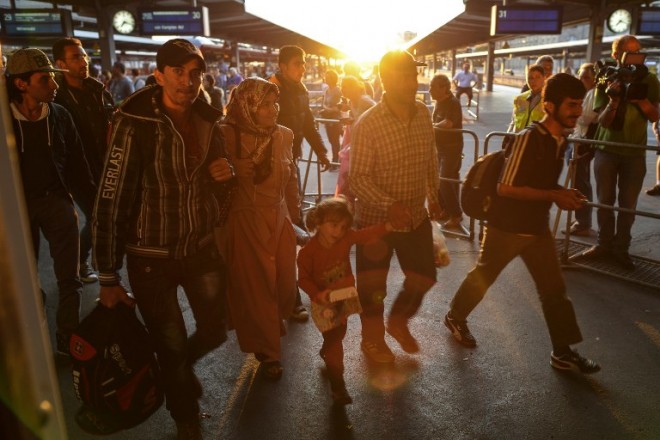Munich buckles under strain of refugee influx as rival protests rage

Migrants arrive at the railway station in Munich, southern Germany, during sunset on September 12, 2015. Arriving by the thousands, refugees stream in to the swamped southern German city of Munich, the entry point to their “Eldorado” which officials say is starting to burst from the influx. On Saturday alone “at least 10,000 people” were expected at the train station in the Bavarian capital, said Eva Hinglein, spokesperson for the Upper Bavaria district. AFP PHOTO / PHILIPP GUELLAND
MUNICH, Germany — Authorities in Munich have said they are overwhelmed by the influx of migrants streaming into the Bavarian capital, as Europe-wide protests saw tens of thousands take to the streets in both support of and opposition to refugees.
More than 10,000 migrants arrived in Munich on Saturday, leading regional officials to sound the alarm and urge other areas in Germany — seen as the promised land by many of those seeking safe haven in Europe — to pull their weight.
Meanwhile, divisions in Europe were evident on the streets, with tens of thousands marching through London waving placards saying “Refugee lives matter,”, while in Eastern European capitals protesters called for refugees to “go home.”
Germany has so far taken the lion’s share of migrants, admitting 450,000 people this year, with Chancellor Angela Merkel’s decision to relax asylum rules for Syrians drawing praise from the refugees, but also sharp criticism from domestic allies and counterparts abroad.
“We no longer know what to do with refugees,” Munich’s mayor Dieter Reiter said, amid fears many of the new arrivals would have to spend the night outdoors.
“Munich and Bavaria can’t overcome this great challenge alone,” a spokeswoman for the Bavarian authorities said, adding the city was struggling to find shelter for all the additional people.
As the newcomers arrived, some onlookers at Munich station held welcome signs to greet them. But there were far fewer than several days ago when cheering volunteers handed out groceries and children’s toys.
Rival protests
As the continent scrambles to respond to the biggest movement of people since World War II, sharp divisions have emerged between the European Union’s 28 member states, at both government level and on the streets.
At the London rally, Britain’s newly elected Labor Party leader and veteran socialist Jeremy Corbyn drew huge cheers when he addressed the crowd from the back of a truck.
“Open your hearts and open your minds,” the opposition chief said, “towards supporting people who are desperate, who need somewhere safe to live, want to contribute to our society, and are human beings just like all of us.”
A boy dressed as Paddington Bear — the marmalade-loving migrant who arrived at London’s Paddington Station from “deepest, darkest Peru” in Michael Bond’s famous books — clutched a sign saying: “Paddington Bear Was A Refugee.”
About 30,000 people also turned out in Copenhagen to express solidarity with asylum seekers, as well as thousands in both Madrid and Hamburg, and smaller numbers in Stockholm, Helsinki and Lisbon.
But in Eastern Europe thousands took to the streets to voice their opposition to the influx, their numbers dwarfing those attending a handful of pro-migrant rallies.
“Islam will be the death of Europe” chanted protesters at a rally in Warsaw which was attended by nearly 5,000 people and began with prayers identifying many marchers as Roman Catholics.
Hundreds also demonstrated in Prague and in the Slovak capital Bratislava, some holding banners reading: “You’re not welcome here so go home.”
The International Organization for Migration said Friday that more than 430,000 people have crossed the Mediterranean to Europe this year, with 2,748 dying en route or going missing.
The emergency has exposed deep rifts within the EU, with “frontline” states Italy, Greece and Hungary buckling under the strain and European Commission proposals for sharing 160,000 of the new arrivals in a quota scheme facing resistance from eastern members.
The Organization of Islamic Cooperation, whose members are hosting millions of Syrian refugees, is due to hold an emergency meeting on the crisis on Sunday.
Nazi era comparison
Hungary meanwhile was working around the clock to finish a controversial anti-migrant fence along its southern border with Serbia.
Hungary has seen some 180,000 people entering illegally this year and has passed a raft of tough new laws that will take effect on Tuesday, meaning anyone crossing the border illegally can be deported or even jailed.
“These migrants are not coming our way from war zones but from camps in Syria’s neighbors… So these people are not fleeing danger and don’t need to be scared for their lives,” hardline Hungarian Prime Minister Viktor Orban told Germany’s Bild daily.
He said Merkel’s decision to relax asylum laws had caused “chaos” and accused European leaders of “living in a dream world.”
The idea that quotas would work is an “illusion,” he said. “The influx is endless: from Pakistan, Bangladesh, Mali, Ethiopia, Nigeria. If they are all going to come here, then Europe is going to go under.”
Austria’s chancellor however slammed its neighbor, comparing Orban’s treatment of migrants to Nazi-era cruelty.
“Piling refugees on trains in the hopes that they go far, far away brings back memories of the darkest period of our continent,” Werner Faymann told German weekly Der Spiegel.














